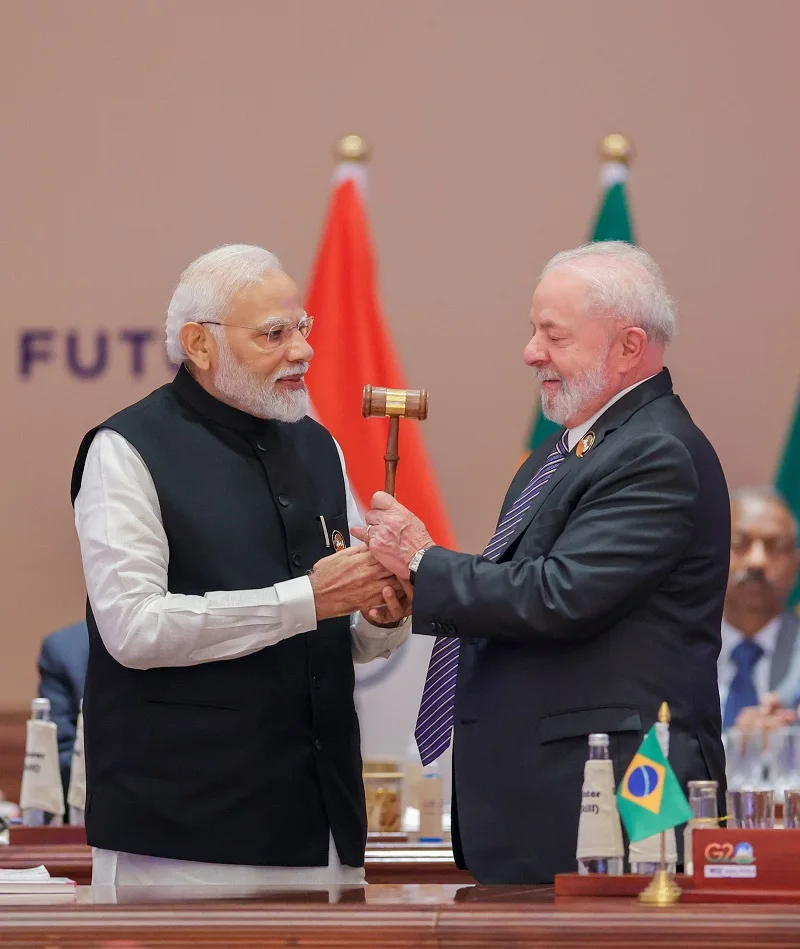A US think tank said that Prime Minister Narendra Modi has delivered practically everything he wanted at the just-concluded G20 Summit in New Delhi, albeit with compromises that primarily includes a joint declaration not mentioning Russia in the war in Ukraine, admitting African Union as a permanent member and sustained efforts to deal with climate change — no hard commitments in phasing out fossil fuels.
The Washington D.C.-based Atlantic Council, a non-partisan organisation that galvanises US leadership and engagement in the world in partnership with allies shaping solutions to global challenges, said theG20 Summit, even without the Chinese and Russian Presidents, has delivered practically everything Modi had wanted.
Hailing Modi’s diplomatic skills aided by his foreign office team secured support for climate financing to assist developing countries (but no hard targets except extending the 2010 pledges by developed countries to transfer $100 billion a year to developing countries by 2025).
The G20 also took on reforms to the multilateral development banks (MDB) to include climate financing in their core missions (no capital increases now but optimising the MDB balance sheets so they can lend $200 billion more over the next decade) and support for the improvement of the Common Framework for Debt Treatment to facilitate the restructuring of low-income countries’ debt.
Hung Tran, a former deputy director of the IMF and a non-resident senior fellow at the Atlantic Council’s GeoEconomics Center, said the Common Framework still remains vague without a roadmap specifying a sequence and timeline of steps to be taken once a debtor country asks for a restructuring.
He pointed out that the group adopted several concrete and potentially helpful initiatives such as mapping the global value chain to help countries identify risks, the digitalisation of trade documents to expedite trade transactions, and the development of public digital infrastructures to promote financial inclusion and productivity.
Also notable is the launch of an India-Middle East-Europe economic corridor connected by railways and ports—in direct competition with China’s Belt and Road Initiative, he said in a statement put up on the council’s website today.
Overall, the outcomes of the G20 Summit will bolster India’s claim to be the voice of the Global South — being able to articulate the demands of developing countries and to engage in negotiations with developed countries to produce useful, if not spectacular, results.
This is a good template for Brazil to take up the G20 presidency in 2024 and South Africa in 2025, Trang said.
In a statement, the Atlantic Council said that in August, India had successfully landed its Chandrayaan-3 spacecraft on the moon.
“This weekend, at a futuristic convention center, in New Delhi that looks like a flying saucer, another landmark landing was achieved.”
The G20 nations approved an 83-paragraph leaders consensus covering issues ranging from plastic pollution to terrorism.
While consensus among the world’s wealthiest countries is always difficult, and the absence of China’s Xi Jinping and Russian President Vladmir Putin, lowered expectations of the outcomes. But Prime Minister Modi guided home the declaration, which welcomed the African Union as a new member to the group, among other important points.
The G20 summit at Delhi saw India launching a new form of inclusive diplomacy, Kapil Sharma, the council’s senior director in charge of South Asia said.
The lead-up to the Summit was fraught with the possibility of Putin and Xi not physically participating in the summit.
Observers believed that their absence was a direct affront to India and would ultimately overshadow India’s presidency and its G20 objectives. But as the summit came to an end, it was clear that India’s objectives were not derailed, and three key themes emerged: consensus, inclusiveness, solutions.
As Russia’s war in Ukraine loomed large over India’s presidency dividing G20 countries, it was unclear as to how the ongoing invasion would be addressed and whether it would derail the agreement of a final communique.
However, after 300 bilateral meetings, 200 hours of negotiations, and 15 drafts, Modi and his foreign office team brought a consensus to the table on the Russia-Ukraine paragraphs in the final G20 communique.
While Russia has applauded the final draft, Ukraine fumed over the declaration.
Ukraine was not invited to the summit.
Inclusiveness: India’s positioning as the voice of the Global South, it shepherded the African Union’s inclusion as a permanent member of the G20. India also pushed for, and countries agreed to, major reforms at global institutions such as the World Bank and International Monetary Fund.
The major initiative came from the US President Joe Biden who wanted the World Bank to raise additional funding from member countries to those in peril so that the endangered countries came out of the debt trap into which China had landed them with its coercive lending methods. The US is providing $18.5 as additional funding to the multilateral financing institution.
India successfully promoted its Digital Public Infrastructure plan as an exportable tech solution for financial inclusion. While it’s unclear whether other countries are capable of replicating India’s digital plan, it has found a niche that goes above and beyond simple capital financing, Sharma said.
With more than 200 meetings in over 60 Indian cities, India was determined to make its presidency the pivot of representing marginalized voices and the Global South.
While India was disappointed not to have Putin and Xi present, this G20 Summit was not about how diplomacy has been done, but rather how diplomacy can be done, Sharma said.
In the end, India’s diplomacy demonstrated its ability to take on current geopolitical disagreements and represent those countries who have felt marginalised for decades.




















